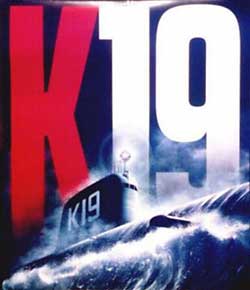 Director Kathryn Bigelow’s new movie, K-19, features chases, special-effects hardware, a mile-a-minute Steadicam, and pedal-to-the-metal editing. So, just as summer in the northern forests brings forth the cries of the loons, so too have we had the usual collection of media stories about how wonderful it is that Hollywood boasts a woman who can direct action films so well.
Director Kathryn Bigelow’s new movie, K-19, features chases, special-effects hardware, a mile-a-minute Steadicam, and pedal-to-the-metal editing. So, just as summer in the northern forests brings forth the cries of the loons, so too have we had the usual collection of media stories about how wonderful it is that Hollywood boasts a woman who can direct action films so well.
This tired, but predictable assertion begs two questions. First, what makes anyone think there are any American men out there who can direct action movies well? I can’t think of more than two or three, unless you count immigrants. Secondly, what is an action movie anyway? The term itself isn’t that old and what it means is completely nebulous.
Let’s take a look at K-19, which starts out, at least, in a conventional manner. In 1961, a Soviet submarine, the eponymous K-19, is in a dry-dock being outfitted for a special mission. It’s captain, Mikhail Polenin, played with appealing energy by Liam Neeson, is so outraged by the shoddiness and inadequacies of the supplies and repairs, that his unceasing protests cost him his command. He’s demoted to executive officer and his post is handed to Alexei Vostrikov, a taciturn older man who has none of Polenin easy leadership abilities.
The mission involves getting close to American reconnaissance in order to shoot a test missile that will warn NATO of Soviet military capabilities. Vostrikov, who’s been running non-stop drills that have brought the crew to the edge of their frayed nerves, accomplishes the mission, but practically destroys the sub in the process. His maneuvers bring the long-simmering tensions between him and Polenin to the surface.
K-19 is based on a true story, one that was not only locked away in the Soviet archives for decades, but apparently wiped away from the surface of the seas. After having accomplished its missile launch, K-19 was ordered to patrol along the U.S. coastline. But on its way, the nuclear-powered sub twice developed catastrophic problems with its reactor. Doubly haunted by the poor equipment on board – both by the initial breakdown and the lack of adequate tools – the men on board became exposed to radiation sickness. Beyond that, the nuclear core was likely to begin a chain reaction that could have ended with an explosion larger than the one at Hiroshima.
But since this was a true story, and we know there was never a huge mushroom cloud over the mid-Atlantic, Bigelow can’t focus merely on what the larger outcome of K-19’s nuclear crisis will be. This brings her back around to the tension between Polenin and Vostrikov and to the way that tension coursed through the crew.
Bigelow’s mastery of what’s called action – or pure kinetic energy – is superior. There’s a lot of thrilling submarine work, and you can imagine what a missile launch is like in the hands of a filmmaker who can make even a soccer match played on arctic ice exuberantly exciting. But her real focus – as it has been from her vampire film "Near Dark" through her extravagant "Strange Days" – is on human action.
And that’s between the dueling captains. Neeson and Ford both give exceptionally good performances, with the emphasis on exceptional. The two tend to be solitary actors, uninclined to share their emotions with other performers. Bigelow has gotten Neeson to open up, to bleed a little, and thus be the heart of the movie. Ford delivers one of those stoic turns that can be so deadly in other films, as in anything he does for Sidney Pollack: "Sabrina" and "Random Hearts." But Bigelow keeps her shots of him short and sharp.
Maybe Bigelow should have put a submarine into her last movie, "The Weight of Water," which debuted at the 2000 Toronto Film Festival. A tale of sexual intrigue that takes place both today and in 1873, it stars Sean Penn, Sarah Polley and Elizabeth Hurley, but has never been released in the U.S. But without that sub – or that wild ride – they just can’t sell it as a quote unquote Kathryn Bigelow film.
